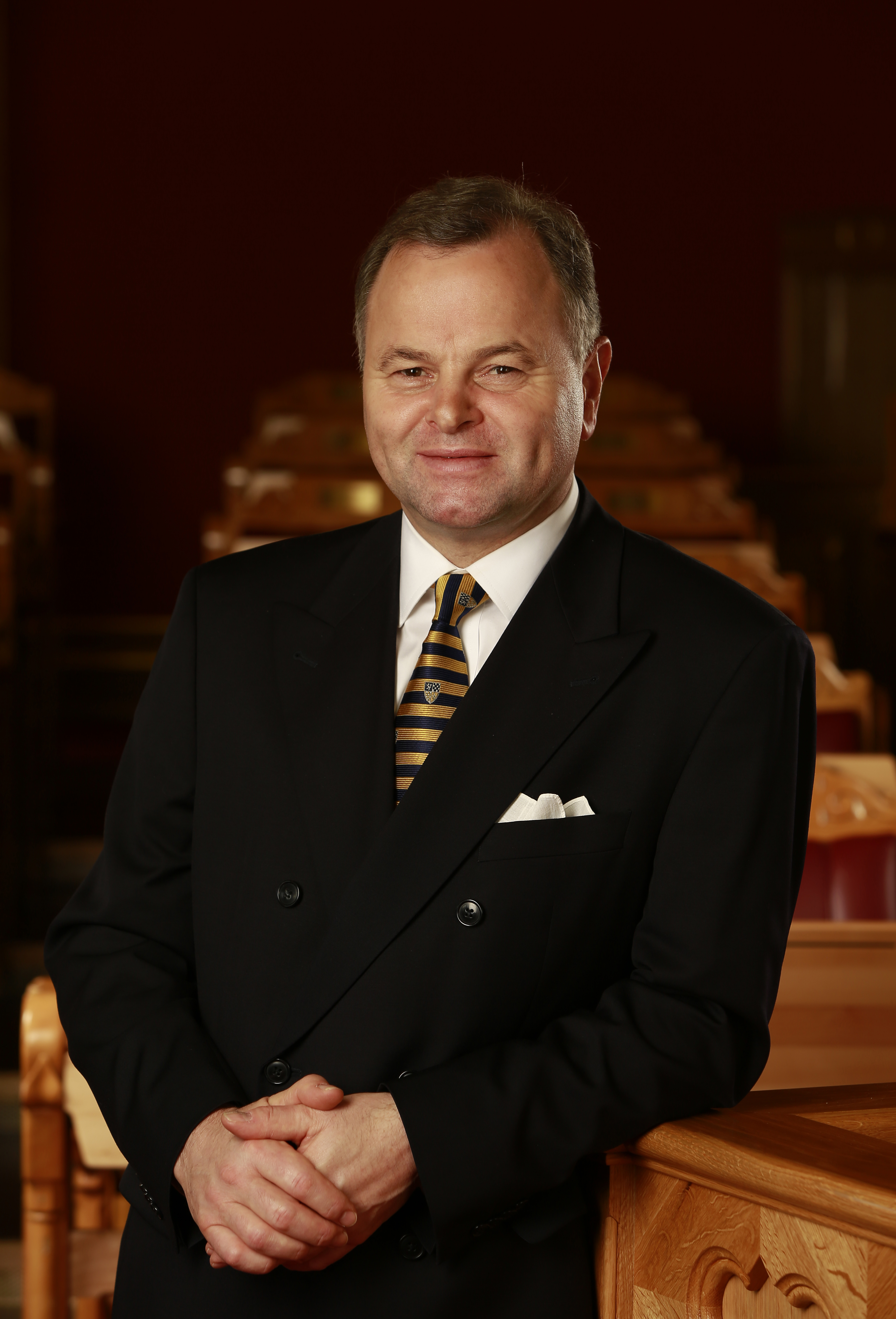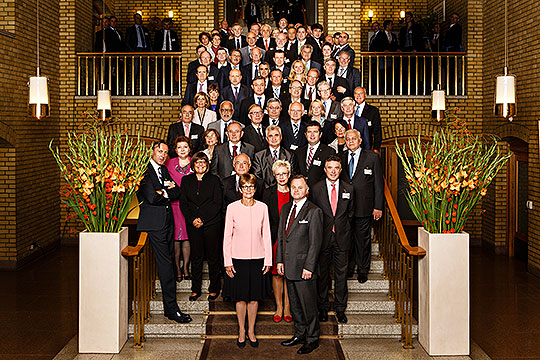ECPP 2014
The Storting will welcome 59 Presidents of Parliament from the Council of Europe's Member States, as well as representatives from many neighbouring and observer countries, during The European Conference of Presidents of Parliament (ECPP) in Oslo on 11 and 12 September.

Olemic Thommessen, President of the Storting. Photo: Terje Heiestad/the Storting.
Watch the conference opening in the Storting September 11
Photos from the conference on Flickr.
Opening speech by Olemic Thommessen, President of the Storting.
Conclusions of the Conference – presented by the President of PACE and the President of the Storting
Link to programme and practical infomation / Lien de programe et information practique
Biennial Conference
The biennial European Conference of Presidents of Parliament was first held in 1975 and is the only arena in which all European Parliamentary Presidents have the opportunity to meet. It is hosted alternately in Strasbourg or in the capital of a Council of Europe member state. At the invitation of the Parliament of Norway, it is held this year at the Storting.
The Conference was opened by the President of the Storting, Olemic Thommessen, the President of PACE (the Council of Europe’s Parliamentary Assembly) Anne Brasseur, the Secretary General of the Council of Europe, Thorbjorn Jagland, and the Norwegian Minister of European Economic Area and European Union Affairs, Vidar Helgesen.
The participants will adresse three major topical issues (see more information under "Documents" below).
- Fundamental constitutional rights and freedoms – participation, trust and public debate as conditions for democracy
- Democracy, Sovereignty and Security in Europe
- Majority and opposition – striking a balance in democracy
Democracy on the agenda
The aim of the ECCP Conference in Oslo is to create an arena for meetings between Europe's parliamentary Presidents ro exchange experiences and discuss the development of democracy and other critical challenges facing Europe.
"National parliaments are the cornerstone of European democracy. The key to a successful democracy lies in confidence and closeness between politicians and the population at large. Different political traditions, which can inhibit democratic development, and the economic challenges currently facing Europe, are examples of situations that can put this confidence to the test, " said President of the Storting, Olemic Thommessen.
A President’s responsibility
"We have, as parliamentary Presidents, a particular responsibility for democratic development in Europe. Not least, it is essential that we pay particular attention to our youth, the young people who as a result of unemployment, and sadly, in some countries, corruption are losing faith in those they elected," he added.
The events unfolding in Ukraine and other parts of Europe are also considered highly relevant topics for this year’s gathering.
The Council of Europe is the oldest pan-European organisation. Founded by treaty in 1949, it is an inter-state organisation with 47 European Member States and a total of 800 million inhabitants. The Organisation, which is based in Strasbourg, works to promote democracy, human rights and the development of the rule of law in its member countries.
Press release from Council of Europe
Speakers
Documents
English
Theme 1
Reference Documents for Background paper Theme 1
Parliamentary Assembly Resolution 1547 (2007) on the state of human rights and democracy in Europe.
CDL-STD(1994)010, Introductory statement by President Antonio La Pergola and CDL-STD(1995)015, Rights suitable for protection by constitutional appeal procedures, Professor J.L. Cascajo Castro.
Parliamentary Assembly Resolution 1836 (2011) on The impact of the Lisbon Treaty on the Council of Europe and Resolution 1610 (2008) on The accession of the European Union/European Community to the European Convention on Human Rights, with further references.
Doc. 12279, as well as Resolution 1746 (2010) and Recommendation 1928 (2010) on Democracy in Europe: crisis and perspectives.
Website of the 2014 World Forum for Democracy.
Theme 2
Democracy, Sovereignty and Security in Europe
Theme 3
Majority and opposition – striking a balance in democracy
ECPRD Priorities and programme
Reference Documents for Background paper for Theme 3
Doc. 11465 rev, as well as Resolution 1601 (2008) on procedural guidelines on the rights and responsibilities of the opposition in a democratic parliament.
Doc. 12278 on Extra-institutional actors in the democratic system.
Doc. 12279, as well as Resolution 1746 (2010) on “Democracy in Europe: crisis and perspectives”
Website of the 2013 World Forum for Democracy.
Doc. 13386 on Internet and politics: the impact of new information and communication technology on democracy.
Français
Thème 1
Droits et libertés constitutionnels fondamentaux -
participation, confiance et débat public comme conditions à la démocratie.
Documents de référence pour le document d’information pour le thème 1
Résolution 1547 (2007) de l’Assemblée parlementaire sur la situation des droits de l’homme et de la démocratie en Europe.
CDL-STD(1994)010, allocution d’ouverture du Président Antonio La Pergola et CDL-STD(1995)015, « Les droits invocables dans les recours constitutionnels », Professeur J.L. Cascajo Castro.
Résolutions de l’Assemblée parlementaire 1836 (2011) sur « L’impact du Traité de Lisbonne sur le Conseil de l’Europe » et 1610 (2008) « Adhésion de l’Union européenne/Communauté européenne à la Convention européenne des droits de l’homme ».
Doc. 12279, ainsi que la Résolution 1746 (2010) et la Recommandation 1928 (2010) sur La démocratie en Europe: crises et perspectives.
Site web du Forum mondial de la démocratie.
Thème 3
Majorité et opposition – trouver un équilibre en démocratie
Documents de référence pour le document d’information pour le thème 3
Doc. 11465 rev, ainsi que la Résolution 1601 (2008) sur les Lignes directrices procédurales sur les droits et devoirs de l’opposition dans un parlement démocratique.
Doc. 12278 sur Les acteurs extra-institutionnels dans un régime démocratique.
Doc. 12279, ainsi que la Résolution 1756 (2010) sur La démocratie en Europe: crises et perspectives.
Site web du Forum mondial de la démocratie.
Doc. 13386 sur Internet et la politique: les effets des nouvelles technologies de l’information et de la communication sur la démocratie.
German
EZPWD Prioritäten und Programme
Programme
Thursday 11. september, 11.00–11.45, The Storting, Storting Chamber
Opening of Conference
Thursday 11. september, 14.30–18.30, Radisson Blu Scandinavia Hotel
Theme 1 – Fundamental constitutional rights and freedoms – participation, trust and public debate as conditions for democracy
Theme 2 – Democracy, Sovereignty and Security in Europe
Friday 12. september, 9–13, Radisson Blu Scandinavia Hotel
Theme 2 – Democracy, Sovereignty and Security in Europe (continuation)
Theme 3 – Majority and opposition – striking a balance in democracy
Friday 12. september, 13, Radisson Blu Scandinavia Hotel
Conclusions presented by the President of the PACE and the President of the Storting
Prime minister Erna Solberg hosts an official buffet dinner at Akershus Castle Thursday 11. September.
Friday 12. September the participants visit Eidsvollsbygningen (Eidsvoll Manor) where the Norwegian Constitution was written and signed in 1814.

"Family photo". Kilian Munch/Stortinget.
Last updated: 17.09.2014 14:41